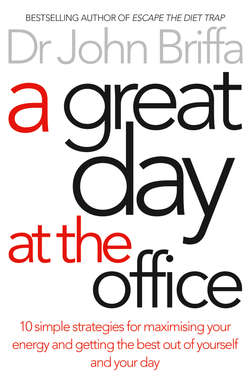Читать книгу A Great Day at the Office: 10 Simple Strategies for Maximizing Your Energy and Getting the Best Out of Yourself and Your Day - Dr. Briffa John - Страница 7
Tried and Tested
ОглавлениеThe information contained in these pages is based on published (but often unpublicized) research. But more than this, it’s also informed by the collective experiences of literally thousands of people. My work as a doctor, speaker and facilitator has brought me into contact with individuals with diverse wellness and performance issues including fatigue, disturbed sleep, low mood, lack of focus, impaired concentration and burnout. Working with these individuals over time has given me the opportunity to discover what actually works to resolve these challenges and have people brimming with vitality once more.
Much of the information and advice offered in this book is founded in science and published research. As a doctor, I am obviously interested in the underpinnings of the approaches I discuss here, and you may be too. But, as I often tell my clients in talks and workshops, gaining this knowledge is not merely an academic exercise: the focus is always on having individuals leave with practical, sustainable strategies that are effective for improving their condition. Rest assured, the concepts and methods presented here have been tried and tested with countless individuals and have been found to give consistent and predictable results in the real world.
Taking Charge
Anyone who owns a smartphone will know the importance of maintaining charge in its battery. Periodically plugging these devices into the mains is just one of those things we have to do if we want to take advantage of their functionality. The human body is a bit like this, too: we can use it to get stuff done, but we have to put something back. If we drain our ‘charge’ more than replenish it, we can end up suffering from periods of ‘low battery power’ that can put a major brake on our productivity. If severe and protracted enough, this situation can ultimately lead people into a state known as ‘burnout’.
It’s fine to put time and effort into work, even in the long term, just as long as we are regularly doing things that, overall, ‘recharge our batteries’ and keep them from running flat. In many respects, this is what A Great Day at the Office is about.
‘Battery charging’ can happen in a number of ways, including making the right food choices and being physically active. However, it can also take place via ‘activities’ that require little or no effort at all. Examples explored within the pages of this book include getting better sleep, napping, increasing sun exposure, listening to particular types of music, and specific breathing techniques. Other examples of things that might help the ‘recharging’ process include an evening spent at the cinema or theatre, enjoying time with loved ones and friends, getting a massage, or even indulging in a nice, long soak in the bath.
Some people, though, can view these sorts of activities as distractions from work, and therefore in their minds classify them as ‘unproductive’ time. However, another way of looking at them is as opportunities to ‘plug ourselves into the mains’, to ensure we are maximally effective in whatever time we apportion to work. In this way, taking time to ‘recharge’ through relaxation and recuperation may not now seem ‘unproductive’, but essential to our long-term success.
I am not suggesting for one moment that we should never work in the evenings, at weekends or on holiday (I do all of these things on a semi-regular basis, by the way). The key is to be able to live and work in a way that ensures our energy and effectiveness rarely falter, if at all, and that our personal sustainability is assured too.
Maintaining charge in the battery can be particularly important for those whose work is transactional or seasonal in nature, such as auditors or those involved in business recovery or mergers and acquisitions. Going into a busy phase already somewhat depleted is ‘risky business’, to be honest. ‘Doing the right thing’ in quieter times can provide a store of power that can be drawn on when the pressure is on and the going gets tough.
